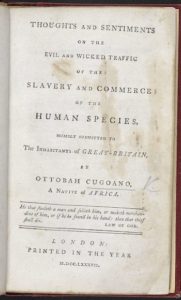
*The birth of Ottobah Cugoano is celebrated on this date, c. 1757. He was a Black African abolitionist, author, anti-imperialist, and natural rights philosopher. He was born Quobna Ottobah Cugoano near Ajumako, in modern-day Ghana. He was a Fanti.
At 13, Cugoano was sold into slavery and transported to Grenada to work on an island plantation. He worked in the Lesser Antilles until he was purchased in 1772 by an English merchant, who took him to England. That year, the merchant had Cugoano baptized as John Stuart; he was given his freedom in England following the Somerset Case. In 1784, Stuart was employed as a servant by the artists Richard Cosway and his wife, Maria.
Through them, he came to the attention of leading British political and cultural figures of the time, including the poet William Blake and the Prince of Wales. Together with Olaudah Equiano and other educated Africans living in Britain, Stuart became active in the Sons of Africa, an abolitionist group whose members frequently wrote to the newspapers of the day, condemning the practice of slavery. In 1786 he played a key role in the case of Henry Demane, a kidnapped Black man who was to be shipped back to the West Indies. Cugoano contacted Granville Sharp, a well-known abolitionist, who was able to have Demane removed from the ship before it sailed.
In 1787, possibly with the help of Equiano, Cugoano published an attack on slavery entitled Thoughts and Sentiments on the Evil and Wicked Traffic of the Slavery and Commerce of the Human Species (1787). By now a devout Christian, he wrote work informed by that religion. His writing called for the abolition of slavery and the immediate emancipation of all slaves. It argues that the slave's duty is to escape slavery and that force should be used to prevent further enslavement. The narrative was sent to King George III, the Prince of Wales, and Edmund Burke, a leading politician. George III and much of the royal family remained opposed to the abolition of the slave trade.
Four years later, in 1791, Cugoano published a shorter version of his book, addressed to the "Sons of Africa". In it, he expressed qualified support for the failed British efforts to establish a colony in Sierra Leone for London's Poor Blacks (mostly freed slaves who had been relocated to London after the American Revolutionary War. Other early settlers were Black Loyalists, also former American slaves, from Nova Scotia, who chose to move to Sierra Leone.) Cugoano called for establishing schools in Britain, especially for Black African students. Nothing is known of Cugoano after the release of his book, including when he died.